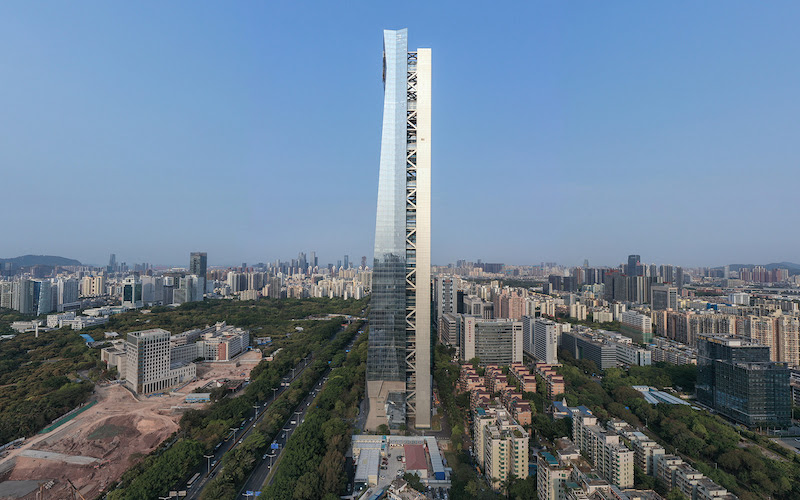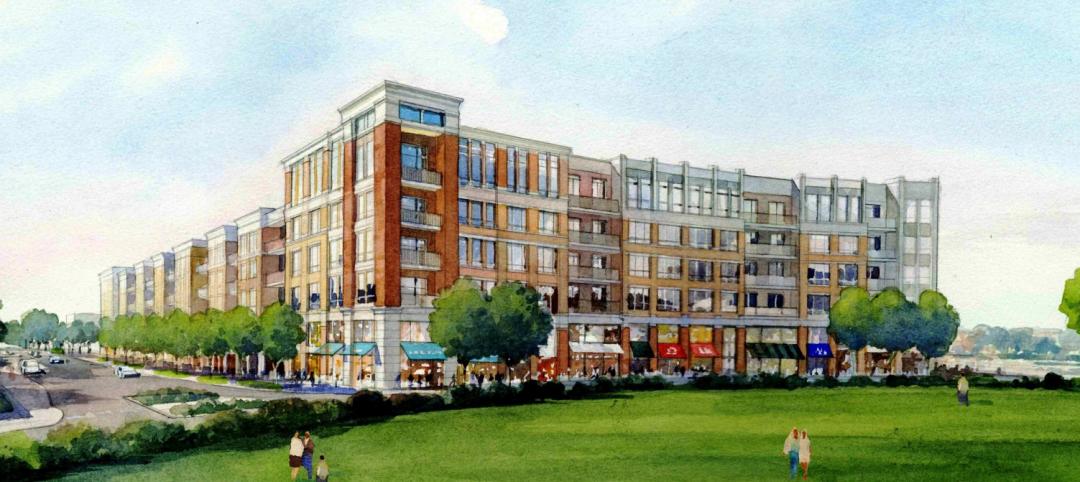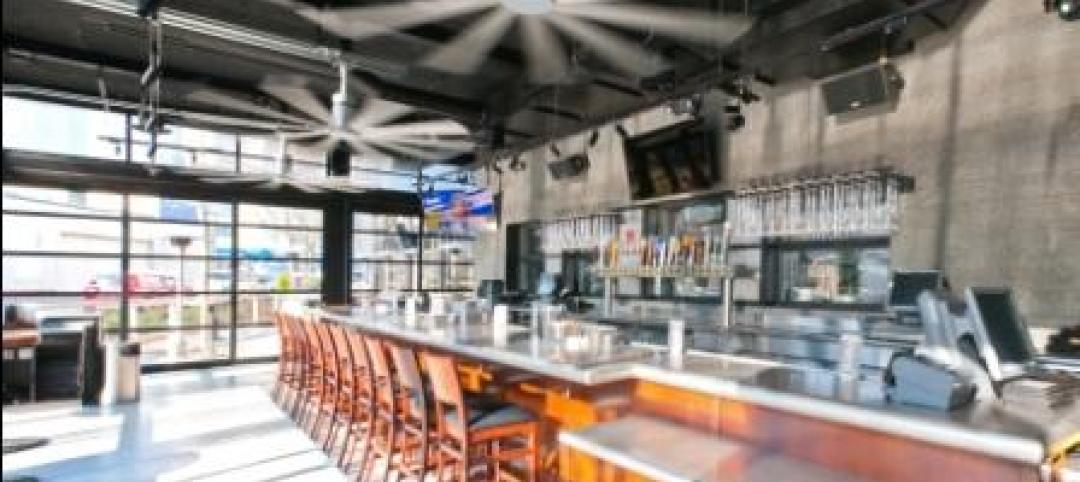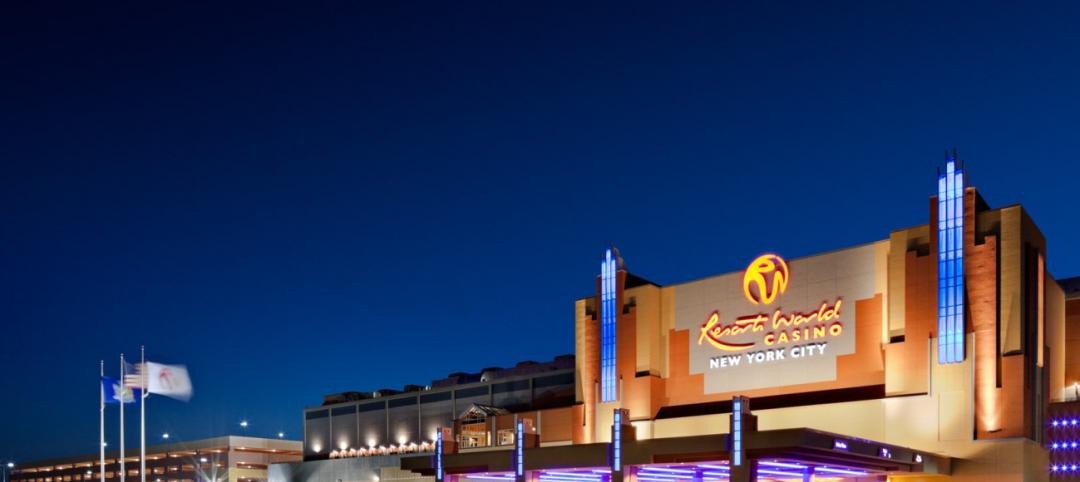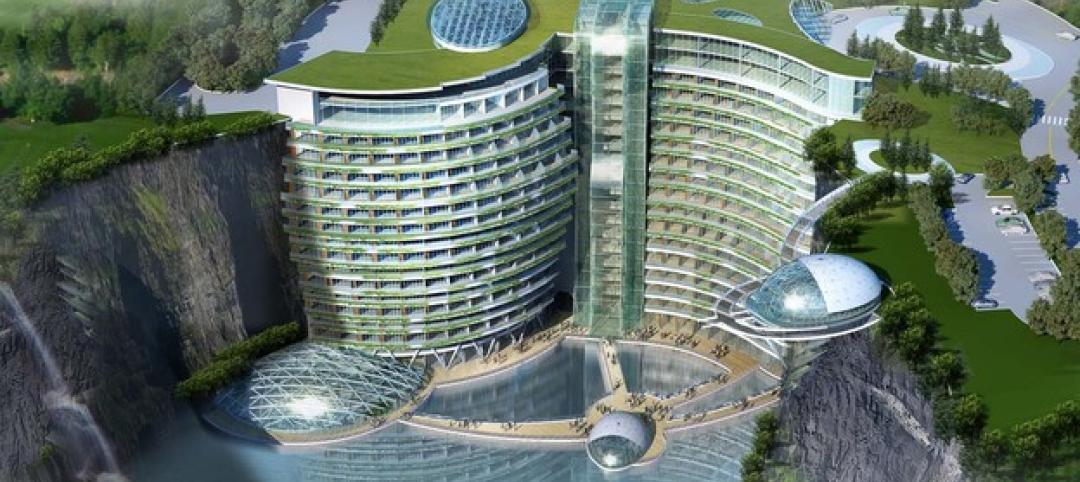Hanking Center, an 1,180-foot-tall mixed-use complex with a commercial office tower and retail center, has completed in Shenzhen, China. The 65-story tower is currently the tallest detached-core building in the world.
The slender profile of the tower emerges above a low-rise retail podium that features angled facets, shadowing the form of the tower above. A series of glass sky bridges and steel mega-braces knit the offset core to the main body of the tower. At ground level, the Center is accessible by multiple entrances and is set within a landscaped public plaza, ensuring a permeable site that invites the public into the retail podium.
The tower’s steel structural system and detached-core configuration, which positions the tower’s primary core on the building’s exterior, promotes higher efficiency and adaptability of interior floor plates. This enhances the tower’s ability to service the varying needs of its occupants. The detached-core configuration also allows for an innovative approach to internal circulation and the creation of social and work spaces that integrate public and private domains. Two secondary cores in the body provide additional structural reinforcement and house mechanical services such as freight and VIP elevators.
By shifting the primary movement and service core outside the main body of the tower, the design minimizes the building’s structural footprint while maximizing open spaces inside the tower. The exoskeletal frame bends and straightens to expand and contract interior floor sizes.
The open floor plates allow for enhanced natural light and airflow. Tenants move from circulation around the core to quieter perimeter offices, creating a public to private gradient. Folded angles are used to merge public components in the podium with private commercial space in the tower. Inside the retail podium, a tapered atrium draws natural light down into the mall creating an inviting interior environment for the public. A grand plaza and dimensional hardscape surrounds the tower’s podium to create a new neighborhood landmark that enhances public activity at the street level.
The project completed in 2018 with a gradual opening that continued into 2021.
Related Stories
| Jun 1, 2012
New BD+C University Course on Insulated Metal Panels available
By completing this course, you earn 1.0 HSW/SD AIA Learning Units.
| May 29, 2012
Reconstruction Awards Entry Information
Download a PDF of the Entry Information at the bottom of this page.
| May 24, 2012
2012 Reconstruction Awards Entry Form
Download a PDF of the Entry Form at the bottom of this page.
| May 23, 2012
Summit Design+Build selected as GC for Chicago restaurant
Little Goat will truly be a multifunctional space. Construction plans include stripping the 10,000 sq. ft. building down to the bare structure everywhere, the installation of a new custom elevator and adding square footage at the second floor with an addition.
| Apr 30, 2012
HSA Commercial selected as consultant for Orland Park’s Main Street Triangle project
HSA will be responsible for designing an overall mixed-use merchandise plan, attracting a unique retail tenant mix and completing leases with prospective tenants.
| Apr 20, 2012
Shawmut completes Yard House Restaurant in Boston
12,000-sf restaurant marks new addition to Boston’s Fenway neighborhood.
| Apr 6, 2012
Batson-Cook breaks ground on hotel adjacent to Infantry Museum & Fort Benning
The four-story, 65,000-ft property will feature 102 hotel rooms, including 14 studio suites.
| Apr 4, 2012
JCJ Architecture designs New York City's first casino
Aqueduct Racetrack complex transformed into modern entertainment destination.
| Apr 3, 2012
Luxury hotel 'groundscraper' planned in abandoned quarry
Would you spend $300 a night to sleep underground? You might, once you see the designs for China's latest hotel project.
| Mar 16, 2012
Temporary fix to CityCenter's Harmon would cost $2 million, contractor says
By contrast, CityCenter half-owner and developer MGM Resorts International determined last year that the Harmon would collapse in a strong quake and can't be fixed in an economical way. It favors implosion at a cost of $30 million.


